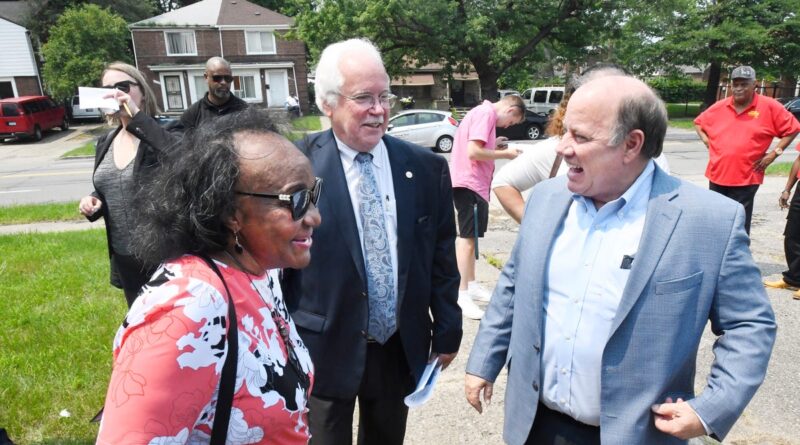Detroit touts low-income tax credits toward $150M in affordable housing projects – The Detroit News
Detroit — The city on Monday celebrated investments of more than $150 million to add hundreds of affordable housing units across the city with the aid of low-income housing tax credits.
Detroit Mayor Mike Duggan gathered with state and city housing officials to discuss $74.5 million in Low Income Housing Tax Credit grants awarded by the Michigan State Housing and Development Authority. Detroit on Thursday received seven of the 25 grants MSHDA awarded statewide toward the construction of 517 affordable units in seven developments in the city.
Duggan noted during his first year in office in 2014, the city didn’t get low-income tax credits from the state toward any projects because Detroit was to “non-functional.”
“I never thought I’d see the day that instead of zero, we landed seven projects for 517 affordable units — $150 million in investment,” the mayor said during a Monday press conference outside the Lewis College of Business, the future site of 105 low-income senior housing units and one of the seven projects receiving the support.
The Lewis College facility, once the state’s only HBCU (Historically Black Colleges and Universities), will be called Meyers Senior. The two buildings will have 32 units, and a four-story senior building, with 73 units will be built behind them.
The campus has sat vacant since the college closed in 2013. Work there is slated to begin next summer and finish in 2023.
The $20 million project will be co-developed by Wallick Communities of New Albany, Ohio, and Southfield-based Presbyterian Villages of Michigan. Rents will be determined by income and range from $335 to $765 per month, officials said.
Another project will convert 1920s-era buildings in the Cass-Henry Historic District into 170 residential units, 84 of which will be affordable housing. The $30.4 million project is being overseen by Olympia Development of Michigan and nonprofit Cinnaire Solutions.
All current residents will have the opportunity to live in a redeveloped unit at rents similar to what they pay now, officials said Monday.
The other five sites will be called the AFG Miller Grove Center in Old Redford, a $14.5 million, 45-unit development by Full Circle Communities; Preserve on Ash in North Corktown developed by The Community Builders, the second phase of a Greater Corktown development plan which will include a $47 million project with affordable and market-rate housing; Woodward Avenue Apartments in Arden Park, a $17 million, 53-unit project developed by MHT Housing & Mooney Real Estate; Brush Park in Brush Park developed by MHT Housing, a 53-unit, $13 million project; and MLK on 2nd in Midtown developed by MHT Housing & Nassar Companies, an $8 million development that will create 33 affordable units.
All but two of the developments are reserved as 100% affordable housing, or 517 of 619 total units in the seven developments. The Henry Street project will feature 86 units not designated as affordable and the Corktown project will include 16 units that won’t be designated as affordable.
AFG, Woodward, Brush, and MLK are set to begin construction in 2022 and open in 2023, Preserve on Ash is scheduled for completion in 2025, officials said.
“Providing affordable housing across the income spectrum is important,” Donald Rencher, group executive for housing, planning and development in the city of Detroit said. “This is a great, amazing day.”
Officials noted the housing is designed for residents earning as little as $16,000 per year and up to $45,000 per year.
“It’ll be affordable housing that will serve the low income residents of the city for years to come, added Chad Benson, MSHDA’s rental development director.
The federal tax credit program, administered by the state, helps fund the construction and rehabilitation of affordable rental housing for households between 30% and 80% of the area median income as determined by the U.S. Department of Housing and Urban Development.
Hartford Village, a retirement community next to the Lewis College site, offers 20% affordable housing units. Administrative assistant Sandra Hunter noted the units are full and there is a large demand for more in the area.
“We get a lot of people that are looking for low-income housing, so this is going to be great,” Hunter added.
In October, Duggan announced with nonprofit and banking leaders the launch of the Detroit Housing for the Future Fund, a nearly $50 million fund with the goal to create affordable housing in Detroit.
Duggan said he will continue to push for affordable housing projects across the city. In recent weeks, Detroit’s City Council adopted a spending plan in recent weeks for more than $800 million in federal COVID-19 relief aid, with a $7 million allocation to create an online city map to locate affordable housing.
“This is what we’re continuing to do,” Duggan said. “We had our plans and we’ve preserved 4,000 [units] already, so 500 more is a good day.”





